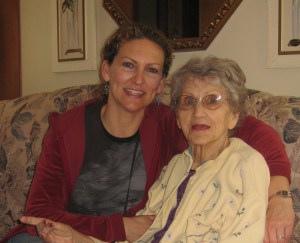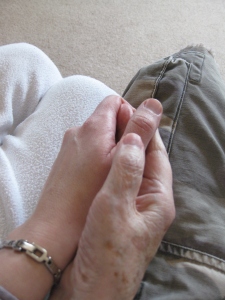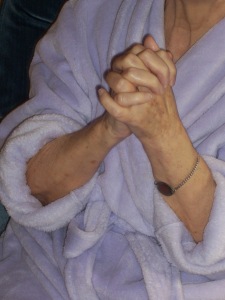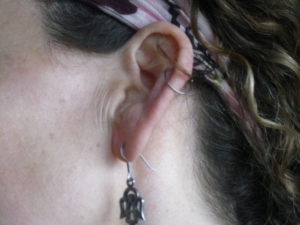I put one foot in front of the other, my body in forward motion. My head is lost. There is no other word. I find myself wondering Did I say that out loud or just think it? To compensate I say, “I’m sorry if I told you this . . . ”
Yesterday on my way to the grocery store, I realized I was still wearing my bedroom slippers. This morning I accidentally put a CFL light bulb in my clothes dryer. Days ago I set it on top of my washing machine, and today when I put wet clothes on the washer, it clung to them as I moved my pile into the dryer. At first when I heard that familiar clink as clothes tumbled, I thought I left some coins in a pocket. When I opened the door to see the many broken pieces of a light bulb, I wanted to crumble on the floor. My mom died, and now I have a frickin’ broken light bulb and mercury fumes all over clean wet clothes in my dryer?!
I went upstairs and told my husband, who got up from his laptop and gave me a good, long hug. Then we Googled “Clean up CFL light bulb.” Big surprise: “in a dryer” was not one of the millions of options.
It’s the weekend, and I have my usual weekend chores. Still, I can’t wait to get to my dad’s and just be there with my siblings. We share the ultimate experience: Mom died. It’s not funny to me when I say it at home alone. My grief comes in waves. When I finally put my head in the dryer to pick up broken slivers of light bulb glass, I sob and sob.
~
Tonight at Dad’s, Ger and I sit so close to each other on the couch that our thighs and arms touch. We have a photo album between us and a beer in our hands. We’re flipping through pages searching for pictures of Mom. Ger went through her own albums last night and brought over a stack of old photos. Now she says, “In every one Mom has a baby on her lap.” I pour over them. In my favorite, Mom has four of her grandbabies—ranging in age from twelve to eighteen months—lined up on the diningroom table in front of her.
My sisters who live away—Juliann, Sharon and Jackie—have arrived. We’re waiting for David and Mary to come from across town. I tell my sisters that Mom’s last words to me were “God dammit.” I make my voice sound like a possessed woman in a horror flick, like the Zombie Girl I seem to be these last three days since she died. “God dammit,” I say again. Everyone laughs. “She really didn’t want me to take her teeth out that night.” Mom never swore until she got Alzheimer’s, and it was funny to me every time. I never imagined a swear word would be the last thing she said to me.

1978: I’m ten and looking at a photo album with my mom. David sits near us.
We look at more albums and drink more beer. Since my mom died, I’ve been fueled by adrenaline and Miller Lite. We can’t seem to choose which photos of Mom we’ll use, so we agree to take out all of the photos we might use. Each of us has a stack next to her.
Later in the day Ger says, “I almost forgot to tell you. Mom’s last words to me were, ‘I love you, Geralynn.’”
I tear up. “Really?”
She nods. “Then Mom said, ‘And you’re my favorite.’” Everyone moans. She so got us. We’ve played this I’m their favorite child game for years. I am ready to award Ger the ultimate winner. Instead I scream, “You bitch.” Everyone laughs some more. “You had me at I love you. Look—YOU made me cry. And my mom died.” We howl with laughter.
After supper, David brings old home movies that he has recently transferred from VHS to DVD. We gather in Dad’s livingroom and watch as our parents open gifts at their fiftieth wedding anniversary party fourteen years ago. Mom is chubbier than I remember. Her voice is strong, almost shrill. After their gifts are open, she dramatically tries to fit her foot into the tiny wedding sandals she wore in 1948 when she was eighteen. We dug these out of her attic, I remember now, and in the background hang Mom’s wedding dress and Dad’s wedding suit, which my brother suspended from the ceiling as anniversary decorations. “Cinderella,” she is saying. She can’t quite get the words out given her laughter. “Cinderella.” We can’t hear Dad over Mom’s cackles, but we can see him wiping his nose.
Dad says now, “I must have had a cold.” He’s in his lift chair, an oversized recliner with an electric lift that allows him to easily get out of it. I’m sitting on the floor at his feet. We’ve got about fifteen family members packed into his livingroom to watch David’s videos.
“You were crying,” I say over my shoulder. We all watch him hand his Kleenex to Mom, and she takes off her glasses and wipes her eyes. She’s crying from laughing so hard. In the video, my son and his cousins are first or second graders who jump up and down beneath the camera so just the tops of their heads appear on film, as if on a trampoline. We watch this, and laugh and laugh at these little boys, now college students. Men. I miss my mom, but at this moment I could weep just at the passage of time.
The next video shows Christmas Eve at David’s house, and our parents are there delivering gifts to his four little ones. His youngest, Evin, is four years old and as soon as he unwraps a “jogging suit” from his grandparents, he strips to his socks and underwear and puts on his new clothes.
Tonight, we roar with laughter, but the people in the video don’t even seem to notice Evin changing his clothes. I’d forgotten so much: that Mom and Dad gave each of their 16 grandkids a red garbage bag full of gifts—that this was how Mom “wrapped.” They delivered gifts on Christmas Eve to each of their five local kids’ houses. Evin runs a wide lap around the room as David records. “Dad,” he is saying, “Dad. I got a jogging suit. I’m jogging.” My mom is so pleased that he loves her gift. She tells Evin’s brother to stop it when he tries to interrupt Evin’s jog. Her sharp tone is one my siblings and I all recognize. We scream with laughter.
Tomorrow we’ll see Mom for the last time, in her casket. Tonight we watch her on the TV screen because of a treasure David brought for us in his coat pocket. I’m not sad, here in Dad’s living room, where thoughts of “personal space” disintegrate when we all pack in. Sometimes on holidays all these people make the house claustrophobic and the air so heavy we have to open the front and back doors, not just because of the body heat but because if we don’t the house may explode. Tonight it feels good, close, just what I need.
I sit on the floor with my nieces, all in their twenties, though on the screen they are little girls in bib overall shorts and funny glasses. Some sisters are squeezed on the couch. Someone leans against a paneled wall. Guys stand around tonight—one hand in a jeans pocket, one hand wrapped around a beer—just like they do in the video.







